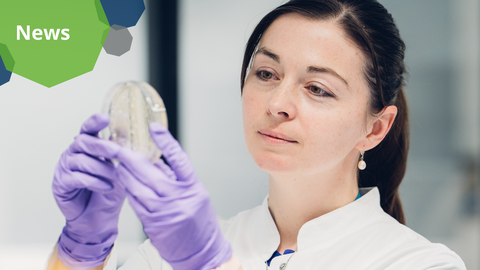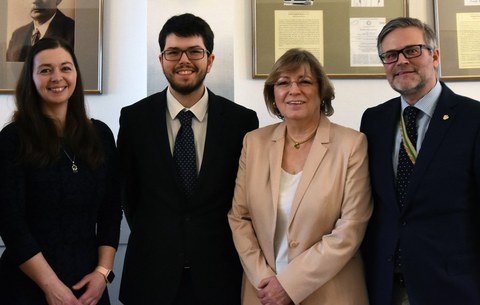Feb 11, 2025
B CUBE Graduate Awarded 2024 Georg Helm Prize for Outstanding PhD Thesis

Dr. Ekaterina Vorobevskaia
TU Dresden has announced the 2024 Georg Helm Prize winners. Dr. Ekaterina Vorobevskaia received the award for an outstanding PhD thesis for exploring antibiotic resistance in bacteria. She completed her thesis in Prof. Michael Schlierf’s group at the B CUBE – Center for Molecular Bioengineering.
Antibiotic resistance is a growing global problem. Bacteria are evolving to withstand antibiotics, making infections harder to treat. Understanding the molecular mechanisms of how bacteria gain antibiotic resistance can provide new tools in the battle against multiresistant bacteria.
The Schlierf group focuses on a specialized genetic system, called the integron, which plays a key role in bacterial antibiotic resistance. The integron system allows bacteria to adapt quickly to changing environments, including the acquisition of multiple antibiotic resistances. Some integron systems function more efficiently than others, allowing bacteria to develop resistance at a faster rate. In her PhD thesis, Dr. Vorobevskaia uncovered a regulatory mechanism behind these differences that can ultimately be exploited as a new approach to fight multiresistant bacteria.
From Master’s to PhD
Dr. Vorobevskaia first joined the Schlierf group during her Master’s studies. Originally trained in biogeography in her homeland, Russia, she later transitioned into life sciences at the Center for Molecular and Cellular Bioengineering of TU Dresden.
“My first degree might be a bit unorthodox for a bioengineer, but I had wet lab experience working in a population genetics laboratory during my diploma thesis. This sparked my interest in molecular biology. Studying molecular bioengineering was both exciting and challenging. Almost every subject was new to me, but at the same time, every one of them was extremely interesting and stimulating,” says Dr. Vorobevskaia.
Dr. Vorobevskaia’s PhD project was built on her successful Master’s thesis. “During my Master’s thesis, I engineered a hybrid DNA substrate, necessary to reconstitute our protein-DNA complex in vitro. This was then the basis of all the experiments in my PhD thesis,” says Dr. Vorobevskaia.
Challenges to Overcome
Although the team agrees that they were fortunate that their initial hypotheses proved correct, the experimental work did not always go as planned.
“The biggest challenge of any single molecule technique is a good sample preparation. It takes time and patience. An unexpected crux of my work proved to be a well-established assay that just did not work for almost a year. In the end, after months of optimizations, a modification of the sample and a change in experimental conditions finally made it work. It was such a rewarding moment to be able to finally solve this problem with my own innovative idea,” explains Dr. Vorobevskaia.
Time was another challenge. The PhD project was funded by a scholarship from the Graduate Academy of TU Dresden. The funding was provided for a three-year duration, a significantly shorter timeframe than a typical four-year PhD offered by many PhD programs.

Dr. Ekaterina Vorobevskaia, Dipl.-Ing. Maximilian Froitzheim, Vice-Rector Research and Sven Spielvogel at the award ceremony for the Georg Helm Prize on 8 February 2025.
Dr. Vorobevskaia will continue her work in the Schlierf lab. The team believes that the weakness they found in the integron system can be further exploited in the form of new pharmacological approaches.
“I am very honored that my thesis was chosen as this year’s winner,” says Dr. Vorobevskaia. “I am truly grateful to Prof. Schlierf for his guidance and support. I also feel very thankful to be part of the B CUBE and the CMCB. The community here is just amazing.”
“It is a pleasure working with Kate. I am very proud of how this project turned out, and I am equally proud of what she accomplished during her time in our group,” says Prof. Schlierf.
About Georg Helm Prize
The Georg Helm Prize was established in 1995 by the Verein zur Förderung von Studierenden der Technischen Universität Dresden e.V. The prize is awarded annually for outstanding doctoral, master's, and diploma theses. The winners receive a gold coin and a medal made of Meissen porcelain.
